The New MongoDB Rust Driver
"Why is MongoDB exploring a
native Rust driver?"
¯\_(ツ)_/¯
-
What we've learned about the language
-
The core goals and tenets of Rust
-
Why you'd want to use the language
What's on the menu?
- MongoDB Drivers
- Safety: The Ownership System
- Concurrency: Threading with mutability
- Usability: Making developers happy
MongoDB Drivers
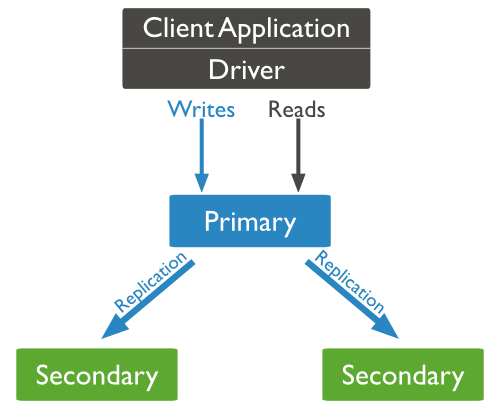
Servers
Your Code
What this talk is on
MongoDB Overview
-
Data is stored in "BSON" documents
- "BSON" -> "binary JSON"
- Documents are grouped into collections
- Databases can have multiple collections
How is the data stored?
Database
Database
Collection
Collection
Collection
Collection
Collection
Document
Document
Document
Document
Document
Document
Document
Document
Document
Document
How to talk to a driver: The CRUD API
All basic functionality can be described by the "CRUD" spec:
C reate - insert new documents
R ead - query existing documents
U pdate - change existing documents
D elete - remove existing documents
Example: Baseball Player Database
How would you query all the players on a certain team?
{
"_id" : ObjectId("55a02f52648dca06dce7e5d0"),
"first_name" : "Jose",
"last_name" : "Alvarez",
"bats" : "L",
"throws" : "L",
"team" : "LAA",
"position" : "P",
"avg" : null,
"tags" : [ ]
}Sample
Document
Basic Steps to Query Data
- Select the database and collection
let db = client.db("mlb");
let coll = db.collection("players");
let filter = Some(doc! { "team" => team });
let mut options = FindOptions::new();
options.projection = Some(doc! {
"_id" => 0,
"first_name" => 1,
"last_name" => 1,
"position" => 1
});
match coll.find(filter, Some(options)) {
Ok(cursor) => Ok(cursor),
Err(e) => err_as_string!(e),
}
Note: The code segment:
produces the BSON equivalent to the JSON object:
(more on that later)
doc! {
"team" => "BOS"
}Step 1
{ "team": "BOS" }- Select the database and collection
-
Set the query options
- "filter" → which documents to select
- "projection" (optional) → which fields from the document to return
Basic Steps to Query Data
let db = client.db("mlb");
let coll = db.collection("players");
let filter = Some(doc! { "team" => team });
let mut options = FindOptions::new();
options.projection = Some(doc! {
"_id" => 0,
"first_name" => 1,
"last_name" => 1,
"position" => 1
});
match coll.find(filter, Some(options)) {
Ok(cursor) => Ok(cursor),
Err(e) => err_as_string!(e),
}Step 1
Step 2.2
Step 2.1
- Select the database and collection
- Set the query options
- "filter" → which documents to select
- "projection" (optional) → which fields from the document to return
- Check the result for a success
Basic Steps to Query Data
let db = client.db("mlb");
let coll = db.collection("players");
let filter = Some(doc! { "team" => team });
let mut options = FindOptions::new();
options.projection = Some(doc! {
"_id" => 0,
"first_name" => 1,
"last_name" => 1,
"position" => 1
});
match coll.find(filter, Some(options)) {
Ok(cursor) => Ok(cursor),
Err(e) => err_as_string!(e),
}Step 1
Step 2.2
Step 2.1
Step 3
- Select the database and collection
- Set the query options
- "filter" → which documents to select
- "projection" (optional) → which fields from the document to return
- Check the result for a success
- Use the results as needed
Basic Steps to Query Data
let mut string = "{\"result\":[".to_owned();
for (i, doc_result) in cursor.enumerate() {
match json_string_from_doc_result(doc_result) {
Ok(json_string) => {
let new_string = if i == 0 {
json_string
} else {
format!(",{}"), json_string)
};
string.push_str(&new_string);
},
Err(e) => return e,
}
}
string.push_str("]}");`Cursor`
implements
`Iterator`
For Instance:
Building with Rust and MongoDB
GridFS and Web Applications





Migrating to Rust 1.0
The Three Core Tenets of Rust
-
Safety through the ownership system
-
Concurrency through core structs and features
-
Usability through standard traits and recursive macros
-
...and speed!
The Three Core Tenets of Rust
-
Safety through the ownership system
-
Concurrency through core structs and features
-
Usability through standard traits and recursive macros
Struct Referencing: Looks Good?



Ownership
Rust guarantees speed and safety at runtime by enforcing ownership and lifetimes at compile time.

Since the Client object is borrowed, its lifetime must predictably last at least as long as the database that contains it. ('a)
Arc
Atomic Reference Count is your friend.


How do we pass an Arc of self?

How do we pass an Arc of self?
Make questionable design decisions.
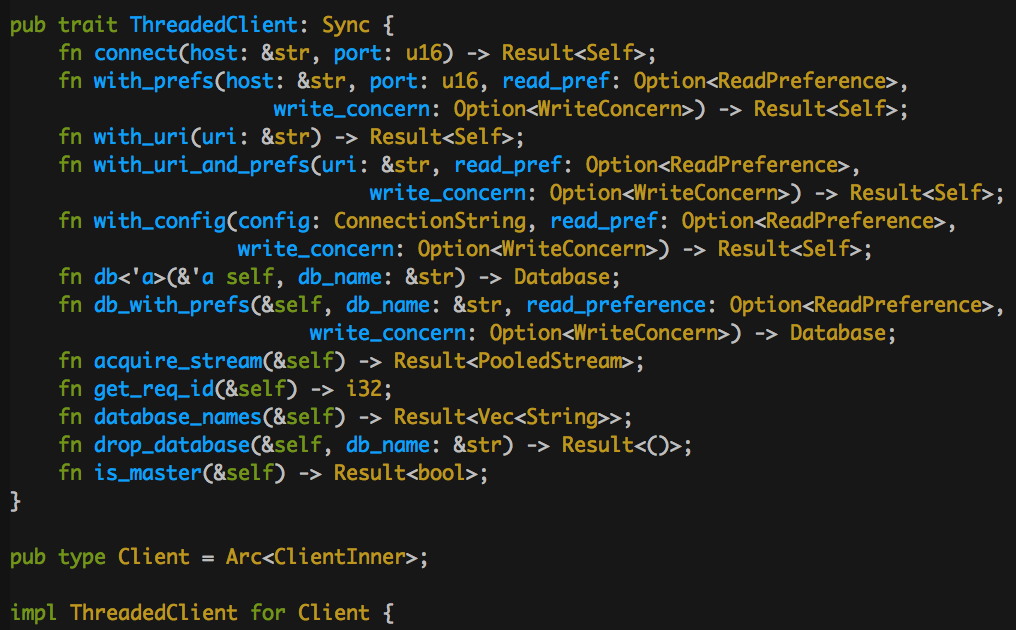
The Three Core Tenets of Rust
-
Safety through the ownership system
-
Concurrency through core structs and features
-
Usability through standard traits and recursive macros
Mutability in Rust
By default, all variables in Rust are immutable.
However, mutability is a bit different in Rust...

Interior and Exterior Mutability
By default, all structs and variables in Rust have exterior immutability.
Immutable structures can still hold mutable components, as long as they follow the ownership system of Rust:
You may have one or the other of these two kinds of borrows, but not both at the same time:
-
one or more references (&T) to a resource.
-
exactly one mutable reference (&mut T).
Mutexes and RwLocks
One approach to guaranteeing these rules at compile time is to use RAII locks.
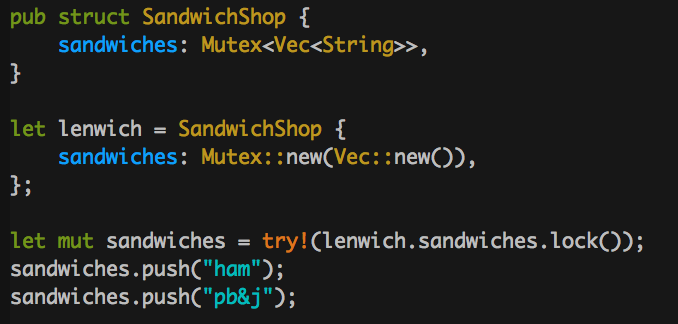
Connection Pools
How we learned to handle mutability,
the hard way.
Motivation for Connection Pools
Each database operation requires a connection to the database.
Sometimes, they take a long time.
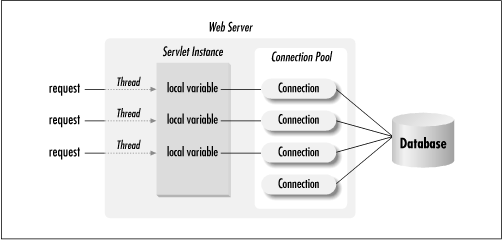
Connection pools handle the creation and reuse of sockets
connected to a MongoDB instance.
Traditional Capped Pool
Fixed-length arrays of locks and sockets.
Acquire socket lock, Use socket, Release socket lock.
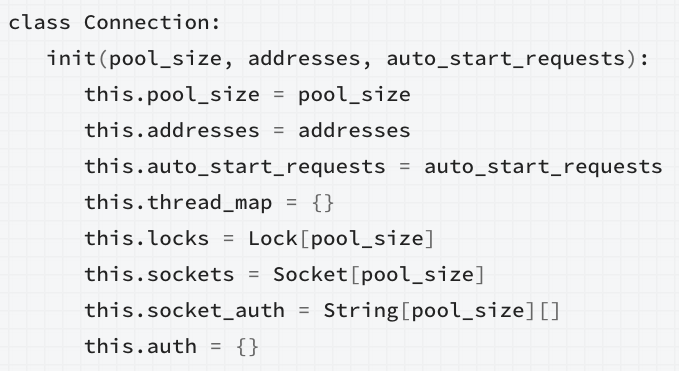
Traditional Capped Pool
An immutable connection pool requires explicit lock and socket initialization on creation.
- Poisoned socket locks: Permanently kills the connection and limits the pool size.
A mutable connection pool requires a mutex to guarantee thread safety.
- Ordered unlocking: If the pool is locked before the socket, it cannot be released
- before the socket.
Hyper
Explicit extraction of lock-free sockets!
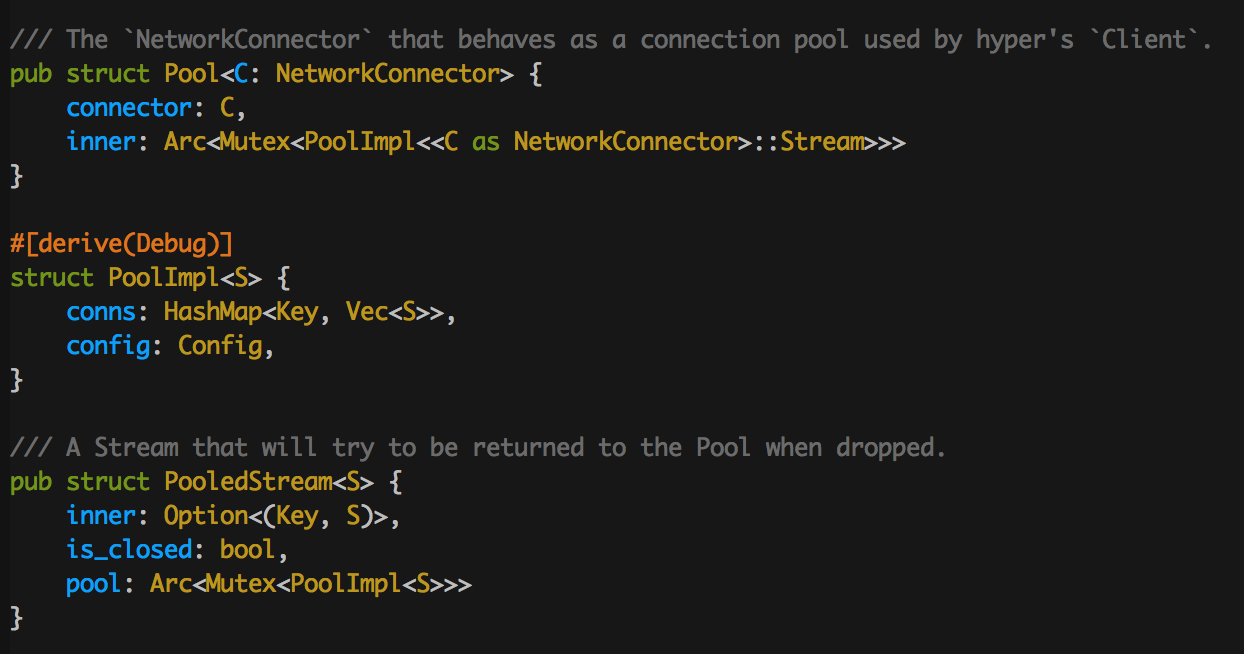
Lock the pool
Pop a stream (S)
Return the stream
with a pool reference
Hyper
The Good:
-
Variable number of lazily-connected sockets
-
Almost lock-free
-
One master lock on the connection pool
The Bad:
The number of open sockets is uncapped.
Recycling vulnerability: Old sockets can be dropped as new ones are constantly made to take their place.
Our Friend, the Condvar
Master pool lock with variable-length, lock-free sockets.
If no sockets are available and we are capped at the number of open sockets, wait on the condition variable until we've been repopulated.

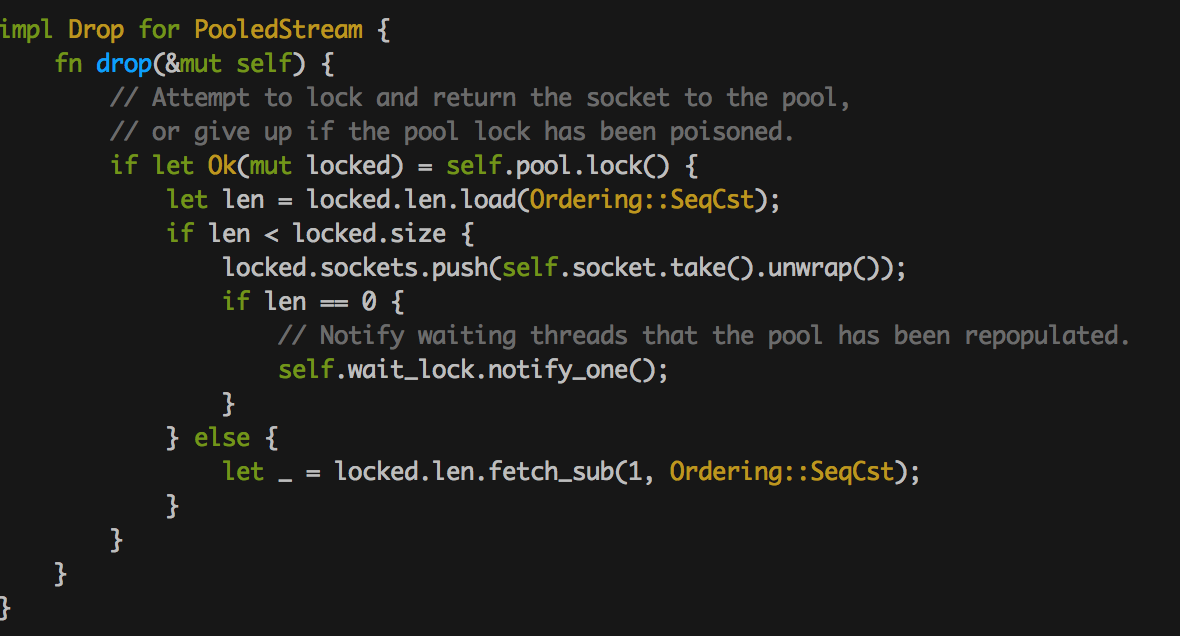
Thank you, Condvar.

The Three Core Tenets of Rust
-
Safety through the ownership system
-
Concurrency through the core structs and features
-
Usability through standard traits and recursive macros
Recursive Macros
The Dark Ages
Not very readable!
let mut update = bson::Document::new();
let mut set = bson::Document::new();
set.insert("director".to_owned(), Bson::String("Robert Zemeckis".to_owned()));
update.insert("$set".to_owned(), Bson::Document(set));First try
Do we really need a second macro?
let update = doc! {
"$set" => nested_doc! {
"director" => Bson::String("Robert Zemeckis".to_owned())
}
};#[macro_export]
macro_rules! doc {
( $( $k:expr => $v: expr),* ) => {
{
let mut doc = Document::new();
$(
doc.insert($k.to_owned(), $v);
)*
doc
}
};
}
#[macro_export]
macro_rules! nested_doc {
( $( $k:expr => $v: expr),* ) => {
Bson::Document(doc!(
$( $k => $v),*
))
}
}Not quite there yet...
Explicit types still needed
let update = doc! {
"$set" => {
"director" => Bson::String("Robert Zemeckis".to_owned())
}
};#[macro_export]
macro_rules! add_to_doc {
($doc:expr, $key:expr => ($val:expr)) => {{
$doc.insert($key.to_owned(), $val);
}};
($doc:expr, $key:expr => [$($val:expr),*]) => {{
let vec = vec![$($val),*];
$doc.insert($key.to_owned(), Bson::Array(vec));
}};
($doc:expr, $key:expr => { $($k:expr => $v:tt),* }) => {{
$doc.insert($key.to_owned(), Bson::Document(doc! {
$(
$k => $v
),*
}));
}};
}
#[macro_export]
macro_rules! doc {
( $($key:expr => $val:tt),* ) => {{
let mut document = Document::new();
$(
add_to_doc!(document, $key => $val);
)*
document
}};
}Ahh...much better!
let doc1 = doc! { "tags" => ["a", "b", "c"] };
let doc2 = doc! { "tags" => ["a", "b", "d"] };
let doc3 = doc! { "tags" => ["d", "e", "f"] };
coll.insert_many(vec![doc1.clone(), doc2.clone(), doc3.clone()], false, None)
.ok().expect("Failed to execute insert_many command.");
// Build aggregation pipeline to unwind tag arrays and group distinct tags
let project = doc! { "$project" => { "tags" => 1 } };
let unwind = doc! { "$unwind" => ("$tags") };
let group = doc! { "$group" => { "_id" => "$tags" } };
#[macro_export]
macro_rules! bson {
([$($val:tt),*]) => {{
let mut array = Vec::new();
$(
array.push(bson!($val));
)*
$crate::Bson::Array(array)
}};
([$val:expr]) => {{
$crate::Bson::Array(vec!(::std::convert::From::from($val)))
}};
({ $($k:expr => $v:tt),* }) => {{
$crate::Bson::Document(doc! {
$(
$k => $v
),*
})
}};
($val:expr) => {{
::std::convert::From::from($val)
}};
}
#[macro_export]
macro_rules! doc {
() => {{ $crate::Document::new() }};
( $($key:expr => $val:tt),* ) => {{
let mut document = $crate::Document::new();
$(
document.insert($key.to_owned(), bson!($val));
)*
document
}};
}Auto-converted types!
and a little bit about traits...
High focus for Rust 1.0: Extendability
- Get core features down, provide traits for the community.
- Large portion of core rust features rely on generic traits.
- Flexible functional-style programming in a largely imperative language.
a few useful traits...
-
Conversion Traits: Auto-convert types.
-
Encoder Traits: Auto-encode structs.
-
Error Traits: Handle errors unobtrusively.
-
Dereference Traits: Utilize the auto-dereferencing system.
-
Iterator Traits: Iterate naturally over custom structs.
-
I/O Traits: Perform I/O ops over custom structs.
- ...and many, many more.
Conversion Traits
Rust makes it easy to auto-convert types.


Encoder Traits
Encoding traits allow arbitrary structs to be converted.
BSON can be decoded into structs and vice versa without any matching involved.
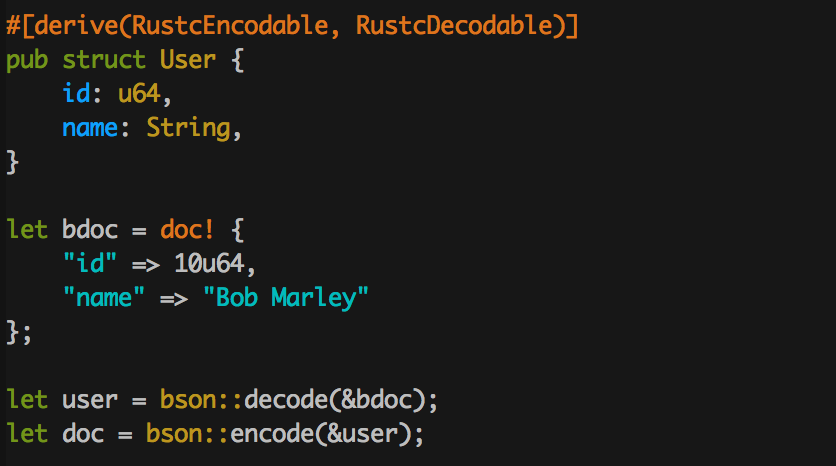
Error Traits
All errors in rust are handled by Result<T, Err>.
Defining your own Error type is easy!
- Conversion traits automatically coerce different types of errors.
- Error traits provide easy access to coerced error information.

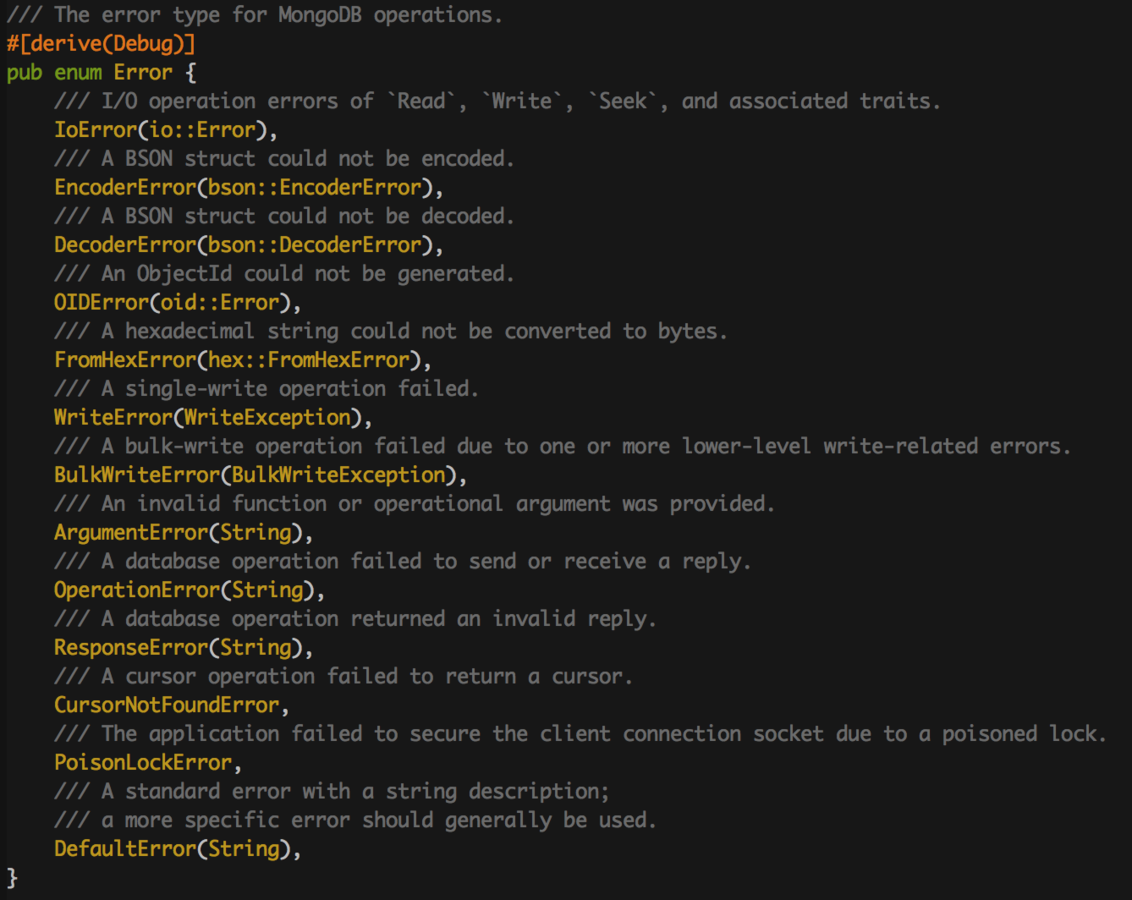
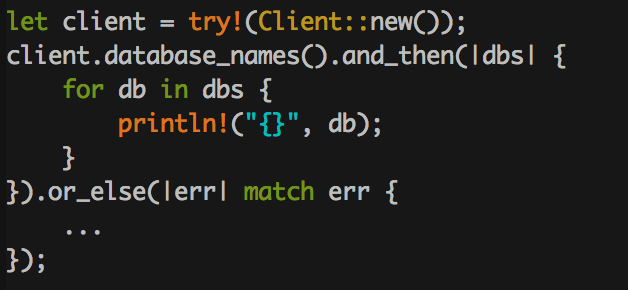
Unobtrusive error handling and control paths.
Dereferencing Traits
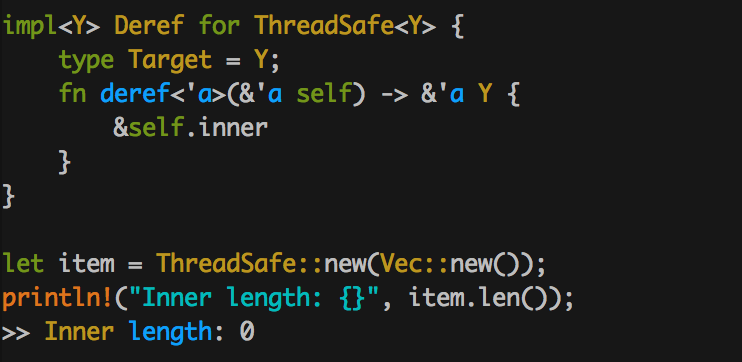
Dereferencing Traits
To provide concurrency and safety, Rust relies on a number of wrapping structs: Arc, Box, MutexGuard, Ref, etc.
An auto-dereferencing system makes this as transparent and user-friendly as possible.
Iterator Traits
Iterate with control.

I/O Traits
Read and write anything.

The Three Core Tenets of Rust
...and speed!

FFI and Unsafety
When the rust compiler isn't enough.
ObjectId
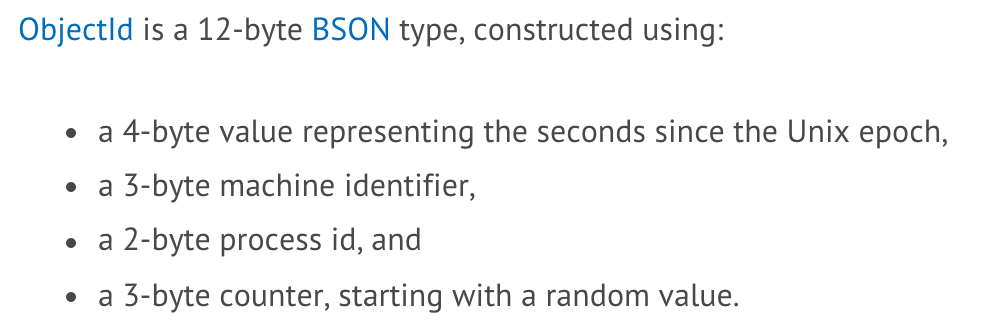
How do I get the machine id?

How do I save a static generated id?
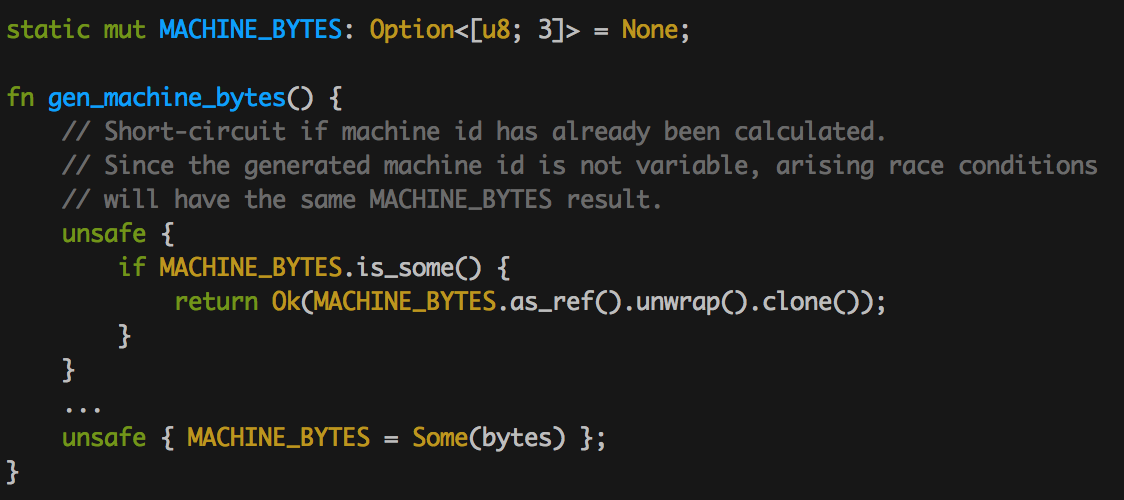
Driver Status
Donesies ✓
-
bson library
-
OID generation
-
stable macro
-
- connection strings
-
wire protocol
-
CRUD, commands, and cursors
-
bulk writes
-
connection pooling
-
error handling
-
automated testing suites
Up Next
-
replica set failover
-
server discovery and monitoring (SDAM)
-
SCRAM-SHA-1 auth
-
shard tagging, indexes, and other server commands